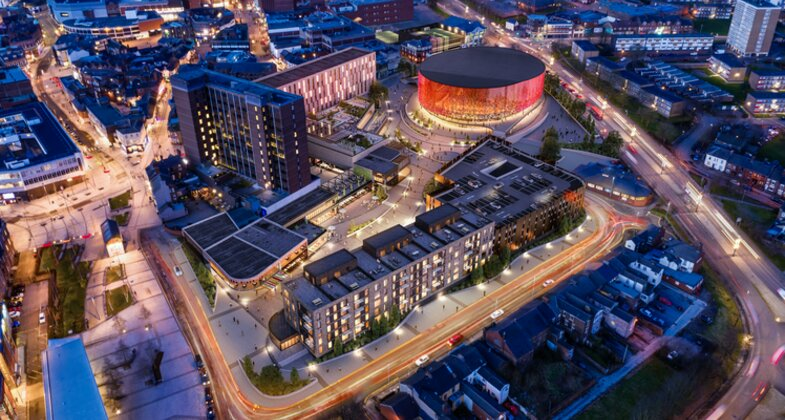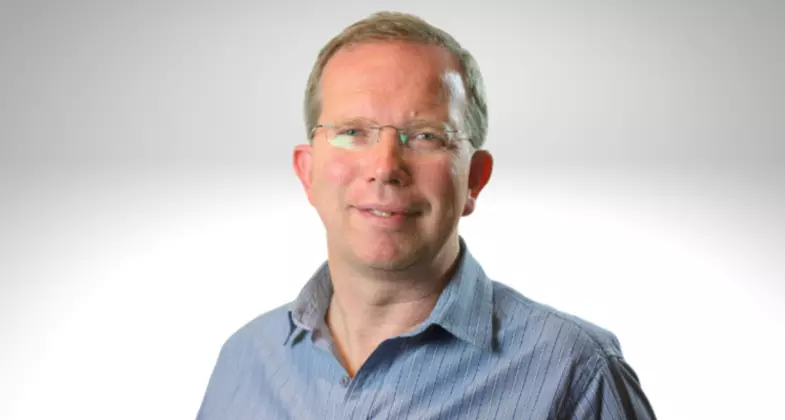Five Minutes with Phil Cresswell, Director of Place, Growth and Prosperity at Stoke-on-Trent City Council
Before the pandemic, Stoke-on-Trent was experiencing an economic resurgence, the like of which it had not seen in generations. With many cities and towns across the UK looking at their plans for economic recovery, Phil Cresswell spoke to Marek Dobrowolski, Place and Regeneration Lead at Berwick Partners, about how Stoke-on-Trent is planning for a post COVID-19 world. They also touched on the team that Phil has been developing and the landscape that they operate within as a vacancy for a new Assistant Director becomes available.
Phil, it’s been 3 years since you joined Stoke-on-Trent City Council – and for someone that started their career in Staffordshire, has it felt like coming full circle?
It has in many ways. I came to Stoke-on-Trent from Merseyside because of the vision that was outlined by the administration about a desire to create a new narrative for the city and how physical regeneration played an important role in order for the city to change the economic and social outlook for Stoke-on-Trent.
The Stoke-on-Trent that I knew in the 1990s, when the city had been significantly affected by the collapse of its dominant industries such as coal mining and what everyone relates Stoke-on-Trent to – ceramics had started to change, but what struck me was the amount of opportunity the city had. Other authorities had already taken a more interventionist approach to try and utilise some of their assets, and Stoke-on-Trent’s ambition was now rising to the fore in a North Midlands economy that was benefitting from its strategic locality, perfectly positioned as the gateway to the North West, East Midlands and West Midlands too.
Even now, I still see many of the public buildings that I had a role in designing back then and almost twenty years later the council and the public sector are again taking the lead and intervening to breathe life into some of those sites, creating new opportunity, jobs and building a better sense of place.
Until March, what had the recent journey been like for Stoke-on-Trent?
Over the last three years, Stoke-on-Trent has had one of the strongest and best performing economies anywhere in the UK. In fact we were the fastest growing economy when measured by job creation. We occupy such a unique position in the country – our physical location, the social and physical assets that we have, and their competitiveness is why the city is such an attractive place for investors, developers and also people looking to live and increasingly spend their leisure time. We are a lot more accessible and affordable when compared to our neighbouring core cities. That’s great news for homeowners, businesses and investors alike!
We have brought forward and developed over 1 million square foot of additional employment space and we have delivered and started a number of game changing schemes such as the East-West Precinct; Smithfield, which includes new Grade A office accommodation, residential apartments and stwo new Hilton Hotels; and of course the success of Ceramic Valley Enterprise Zone.
We have also built a significant number of new houses sites across the city and even in the teeth of the pandemic, we have a significant pipeline of projects and a continued strong and substantial demand from investors and developers for both residential and employment land. Importantly, we can also service and deliver on that demand. We have the space, the sites, a willingness and the resources to really engage and support investors. So, the recent story of Stoke-on-Trent has been one of delivering on our potential, and that’s also the story of our recovery strategy – delivering on our potential – we use the phrase Powering Up the City, and that’s exactly what’s happening here. Therefore the new role of Assistant Director is a critical appointment for us as they will take the lead on much of this.
What has the pandemic meant for Stoke-on-Trent in terms of place-making?
We are still clearly seeing the impact on our communities and as a council we are doing all we can to support people and their families. Economically at present, we are tracking slightly ahead of the national curve in terms of unemployment. There is still an element of our industrial heritage behind this and also the impact on SMEs and areas such as hospitality and retail. Again, we are working hard to support businesses in the city. Stoke-on-Trent is also not a panacea, and in some of our wards we still have and see significant challenges with void retail spaces in our towns. There is no quick fix to some of this and we are working with those communities to identify what is needed there, what the future can be based on and how we start to bring this forward.
It was important therefore that quickly after the team responded to the immediate impact of the pandemic, they started to think and to plan our strategies to see the city powering back out of the other side of the crisis. It is important also that whilse we consider COVID-19, there is also the issue of Brexit to consider too.
We are using and co-ordinating our own knowledge and that of our partners in the wider public and also the private sector to really understand what is going on locally, regionally and nationally. This is so our response and strategies are resilient; they provide us with control and agility over elements of the market that we can control and means we are able to take advantage of market opportunities. Like a lot of locations, we have a lot to lose, but unlike a number of other locations, we have significant and competitive assets that we can utilise.
For instance, if you need a hundred thousand sq. ft of employment space, we can provide that right now and we will work with you to bring that development forward at pace. If you want to develop Grade A floor space with us as a co-investor, with access to an available workforce who don’t have to commute or who don’t want to now spend an hour on the M6 or on public transport, then we can provide that in a city centre location with a real mix of cultural assets.
What has been interesting is we are seeing a modal shift clearly in terms of working patterns. As a city and region, nearly half a million people live within a 25-mile travel to work radius. The shift to home working has seen people re-discover their local areas, our parks for instance have never been so busy and the footfall to them is tracking at about 40% above the national average. And while the city centre has seen an impact in terms of footfall, it is holding up very well in comparative terms.
We know from our investment team, which the new Assistant Director will lead, that organisations are evaluating where they need to be located, considering costs, location and also now the well-being and requirements of their staff. The enquiries haven’t dropped during the pandemic, in fact for all the reasons we have just talked about they have increased.
With people now very focused and aware about quality of life and affordability, Stoke-on-Trent is very appealing right now and with people not needing or feeling the need to live and travel into core cities the opportunity presents itself for Stoke-on-Trent to adopt the mantle of a competitor or disrupter brand.
What landscape will your new Assistant Director inhabit and what will be in their in-tray?
We have had a really successful economic story, we have spent in some ways a number of years tackling the issues of the past and the next challenge is to take the city, a city that’s on the up, and develop what will be the next iteration for Stoke-on-Trent.
There is a huge amount of exciting work for someone to come and do in the city. This is a really big job, it is central to Stoke-on-Trent’s future but it’s a fantastic opportunity to really come and make a mark and to get your hands on what I think are some tremendous professional challenges and therefore opportunities.
In terms of their in-tray, the incoming Assistant Director will build and deliver our asset maximisation program to make sure that we are maximising the potential of each investment opportunity and programme.
We launched a successful Enterprise Zone that still has enormous untapped potential, and so they will be responsible for the future of the Ceramic Valley EZ, including the next generation of employment sites that the council will be place leaders on.
Within the city, it will be to deliver the ‘Transforming Cities’ Program, designing the next phases for Smithfield and master planning and overseeing a delivery programme right at the heart of the city centre. Overseeing HS2 connectivity and unlocking the potential of the Learning Quarter, home to Staffordshire University and the Swift House development site. This involves working with DfT and also with Homes England to ensure that we get that opportunity underway. We are an old city, a Victorian city a world famous city for pottery, ceramics and for engineering too; we have some incredible buildings, some of which have been unloved and underutilised that we are now really bringing back into use – for instance the Queen’s Theatre which has stood empty for years we are close to placing at the heart of a regeneration scheme that will bring so much more to the town centre of Burslem in the north of the city.
As you can imagine, with the three ’front doors’ that we have across the West and East Midlands and North West, the role will involve taking a lead in the region and working with partners in the LEP, the County Council, and with Midlands Engine to develop the A50/A500 manufacturing corridor, which is of regional importance.
That latter point is really key also, because this role will see them working with a range of partners here on the ground, but the profile we have developed here in Stoke-on-Trent, the political profile we have and will continue to have, means there will be a lot of work alongside the major government departments. Stoke-on-Trent has the opportunity to be the blueprint for the government’s levelling up agenda. We are up for it, there is tremendous political will and passion in Stoke-on-Trent to transform the city. So yes, this is a big job in a city with huge aspiration, with assets and a willingness to match – we just need the Assistant Director who will really relish this landscape and an environment, with a key focus on delivering key results at pace for the benefit of Stoke-on-Trent.
Marek Dobrowolski leads our Place Practice nationally. His focus is on Regeneration, Economic Development & Infrastructure appointments in Local Government and its associated agencies.






